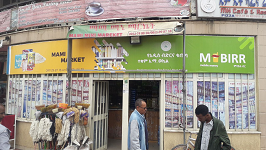By Eyerus Hadgu – Less than 35% of Ethiopians have access to financial services. Most bank branches are clustered around Addis Ababa and other urban areas, whereas over 80% of the population lives in rural areas, according to the World Bank.
In other African countries, such conditions led to the rapid growth of mobile money and agent banking services, like M-Pesa in Kenya. These systems put financial services at the fingertips of consumers, letting them transfer money and make payments using their mobile phone. And through widespread agent networks, people could deposit and withdraw money from small shops in their village, rather than traveling long distances to a bank branch in the nearest town.
In Ethiopia, mobile money first became available in 2015 with the official launch of M-BIRR. This has been followed by other mobile money services, such as HelloCash, CBE-Birr, and Amole. M-BIRR currently has over 1.9 million customers in Ethiopia. It is provided by 6 leading microfinance institutions (Amhara, Addis, Oromia, Dedebit, OMO, and PEACE Microfinance) and is available at over 19,000 branches and agents across the country, making it Ethiopia’s largest agent banking network.
COVID-19 has created many disruptions in Ethiopia this year, impacting both merchants and consumers. The World Health Organization warned that paper currency can risk spreading the virus, and encouraged adoption of digital payments as a safer alternative. To help combat COVID, several leading mobile money services – M-BIRR, Amole, and Hello Cash – announced fee waivers, public awareness efforts, and other initiatives earlier in the year.
Merchants are looking for ways to get paid electronically and maintain their physical distance from customers. In addition, Ethiopia is starting see a dramatic increase in online merchants, with dozens of e-commerce, ride-hailing, betting, and other online merchants launching in the past 12 months. This has been encouraged by new regulations meant to formalize and support the sector.
Mami Market is an M-BIRR agent in Addis Ababa located around Betel. Its owner Mr Redwan Sano says that ‘’being an M-BIRR agent has been a good opportunity, as it earns commissions for registering and servicing M-BIRR customers. It also offers Mami Market customers an easy way to pay for groceries electronically, which is a safe and useful alternative during COVID-19’’.
The results to-date have been dramatic. In the past 10 months, M-BIRR has seen a sharp increase in merchants accepting mobile payments through the service. From just a handful of merchants in January, M-BIRR now has over 25,000 merchants in its network, with more merchants joining every day. Similarly, mobile payments transactions for M-BIRR has skyrocketed over 1,000% since the start of the year.
While Ethiopia appears to be turning a corner in mobile payments, there is still significant room for growth. Of Ethiopia’s over 110 million population, it is estimated that only a few percent have mobile money accounts or actively use these services. This is in contrast to neighbors like Kenya, where an estimated 50% of GDP flows through M-Pesa. However, with continued public education, support from regulators, and steadily improving telecom and internet infrastructure, the future for mobile money in Ethiopia looks bright.
